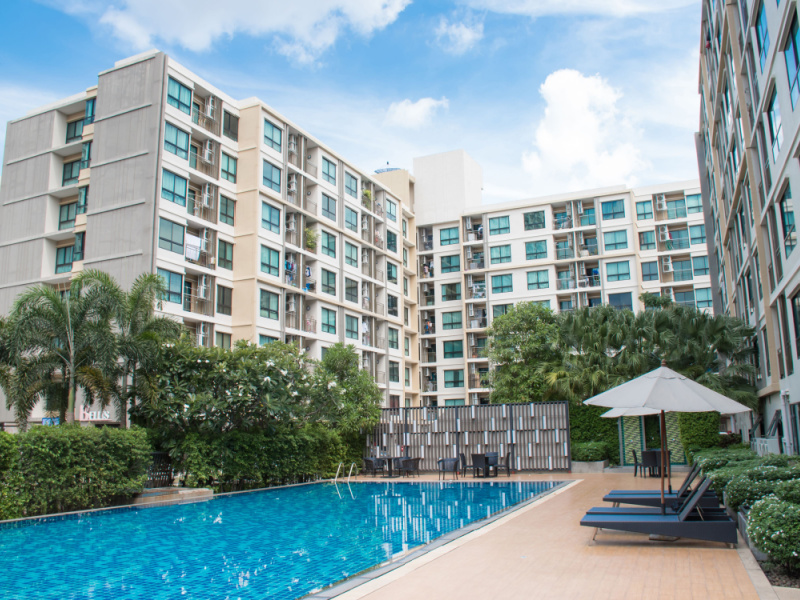What Does a Condo Association Insurance Policy Cover?
Own a condo? Here's what to know.

Own a condo? Here's what to know.

Buying a condo can be a great choice for people who enjoy a sense of a community and would prefer not to have to deal with some of the upkeep and maintenance that comes with owning a house.
But what’s the deal with insurance policies for condos? Are you as an owner responsible, or is the Homeowners Association (HOA) the responsible body? What does homeowner’s insurance for a condo cover, and what does condo association insurance cover?
A condo association insurance policy is a master insurance policy held by an HOA or condo association.
It covers a condo building’s structure and common areas. Typically, condo association insurance coverage is a “bare walls” policy. This means that it covers everything up to the bare walls (things like your unit’s drywall, studs, and insulation).
However, occasionally a condo association insurance policy may be a “single-entity” or “all-in” policy. Such policies may cover cabinets, flooring, and even built-in appliances.
The type of policy depends on your specific HOA and the insurance they’ve purchased, and may also be influenced by state and local laws and regulations.
Additionally, sometimes homeowners associations may choose to purchase additional coverages, such as fidelity liability, which protects against fraud or theft, or workers comp, which can cover the costs should a condo worker get injured on the job.

This can get tricky since the names are so similar, but bear with us. The main point is that the condo association insurance policy is something your HOA handles, and your individual condo insurance is something you handle.
Condo association insurance policies cover the common areas and structure of the condo building. It includes things like liability insurance, loss of use, personal belongings (in this case, property that belongs to the homeowners association), and structural damage. It’s generally paid for through the HOA membership fees that condo unit owners pay.
Then there’s condo insurance, or HO6 as it is known, a type of homeowners insurance policy that covers your individual unit from its walls-in. You’d want to get your own personal HO6 policy as part of the condo-buying process.
Like most homeowner’s insurance policies, condo insurance covers personal property, loss of use, personal liability, and medical coverage.
To sum up, a condo association insurance policy covers things that you, as a condo unit owner, are not responsible for.
A condo association insurance policy generally covers the shared amenities, like pools, tennis courts, and parking garages, and public areas of your condo complex. Very occasionally it covers some aspects of private units as well.
The association’s master policy includes:
This aspect of the policy is meant to cover the HOA if someone is accidentally injured or harmed within the areas that the HOA is responsible for. For instance, if someone slips and falls on wet tile while walking around the communal swimming pool, a condo association insurance policy will cover the legal and medical costs of that fall.
This aspect of the policy covers property damage that may occur to the building structure. For instance, if a huge storm blows a tree branch into the lobby window, breaking it, a condominium association insurance policy will cover the cost of repairing the damage.
The policy also covers common areas against damage—areas like the lobby, athletic facilities, and so on.
Becoming a condo owner is a huge step. Luckily, one of the advantages of living in a condominium complex is that you are covered all the way through.
Your HO6 insurance coverage will usually cover your own unit and property, and the HOA’s condo association insurance will generally cover the condominium building and common areas.
But to make sure you have a good handle on who’s responsible for what and how your condo association handles damages and claims, it’s a good idea to read your association’s bylaws.
A few quick words, because we <3 our lawyers: This post is general in nature, and any statement in it doesn’t alter the terms, conditions, exclusions, or limitations of the policies issued, which differ according to your state of residence. You’re encouraged to discuss your specific circumstances with your own professional advisors. The purpose of this post is merely to provide you with info and insights you can use to make such discussions more productive! Naturally, all comments by, or references to, third parties represent their own views, and Lemonade assumes no responsibility for them. Coverage may not be available in all states. Please note that statements about coverages, policy management, claims processes, Giveback, and customer support apply to policies underwritten by Lemonade Insurance Company or Metromile Insurance Company, a Lemonade company, sold by Lemonade Insurance Agency, LLC. The statements do not apply to policies underwritten by other carriers.
Please note: Lemonade articles and other editorial content are meant for educational purposes only, and should not be relied upon instead of professional legal, insurance or financial advice. The content of these educational articles does not alter the terms, conditions, exclusions, or limitations of policies issued by Lemonade, which differ according to your state of residence. While we regularly review previously published content to ensure it is accurate and up-to-date, there may be instances in which legal conditions or policy details have changed since publication. Any hypothetical examples used in Lemonade editorial content are purely expositional. Hypothetical examples do not alter or bind Lemonade to any application of your insurance policy to the particular facts and circumstances of any actual claim.